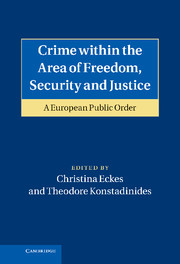Book contents
- Frontmatter
- Contents
- Contributors
- Acknowledgements
- ABBREVIATIONS
- Introduction
- 1 EU criminal justice: beyond Lisbon
- 2 The European Union policy against corruption in the light of international developments
- 3 The EU's anti-money laundering agenda: Built on risks?
- 4 EU anti-money laundering regulation: Multilevel cooperation of public and private actors
- 5 The legal framework of the European Union's counter-terrorist policies: full of good intentions?
- 6 Organised crime: developments and challenges for an enlarged European Union
- 7 The Europeanisation of extradition: how many light years away to mutual confidence?
- 8 The European Evidence Warrant: Mutual Recognition and Mutual (Dis)Trust?
- 9 Law and order and internal security provisions in the Area of Freedom, Security and Justice: before and after Lisbon
- 10 The external dimension of the EU's Area of Freedom, Security and Justice
- Index
- References
1 - EU criminal justice: beyond Lisbon
Published online by Cambridge University Press: 01 June 2011
- Frontmatter
- Contents
- Contributors
- Acknowledgements
- ABBREVIATIONS
- Introduction
- 1 EU criminal justice: beyond Lisbon
- 2 The European Union policy against corruption in the light of international developments
- 3 The EU's anti-money laundering agenda: Built on risks?
- 4 EU anti-money laundering regulation: Multilevel cooperation of public and private actors
- 5 The legal framework of the European Union's counter-terrorist policies: full of good intentions?
- 6 Organised crime: developments and challenges for an enlarged European Union
- 7 The Europeanisation of extradition: how many light years away to mutual confidence?
- 8 The European Evidence Warrant: Mutual Recognition and Mutual (Dis)Trust?
- 9 Law and order and internal security provisions in the Area of Freedom, Security and Justice: before and after Lisbon
- 10 The external dimension of the EU's Area of Freedom, Security and Justice
- Index
- References
Summary
INTRODUCTION
The Lisbon Treaty effects substantial reforms to the scope and structure of the policy domain of EU criminal justice – that is, matters of judicial cooperation in criminal matters and police cooperation, previously dealt with in the now defunct third pillar of the European Union. Adopting the familiar language associated with EU integration, these reforms broadly ‘communitarise’ this field and therefore establish it more firmly at the ‘supra-national’ (as opposed to ‘intergovernmental’) end of the integration scale. The advantages this promises to bring in terms of efficiency, effectiveness, transparency and legitimacy are considerable and the scale of the comunitarisation shift marks a major breakthrough in what is undoubtedly a sensitive and contested policy domain. Having said that, the communitarising impact of the Lisbon Treaty is, in a range of specific ways, heavily qualified. This reflects the continued existence of a tension between the development of an EU agenda and approach to criminal justice (even one based much more squarely than ever before on a logic of mutual recognition) and a tendency for States (some more than others) to wish to be able to safeguard their own particular interests. For political reasons, the manifestations of this tension in the Lisbon Treaty are more numerous and more wide-ranging than under the previous legal settlement. Indeed the degree of differentiation potential that has been introduced into this field has the capacity to seriously undermine the emergence of a coherent (and therefore effective and legitimate) EU criminal justice agenda in the future.
- Type
- Chapter
- Information
- Crime within the Area of Freedom, Security and JusticeA European Public Order, pp. 10 - 42Publisher: Cambridge University PressPrint publication year: 2011
References
- 1
- Cited by



